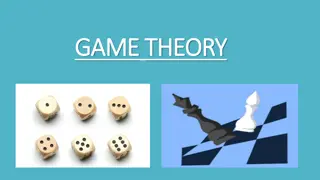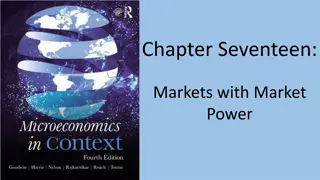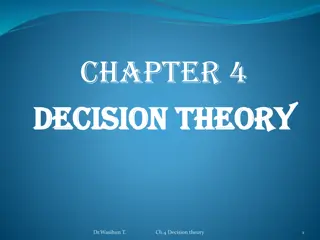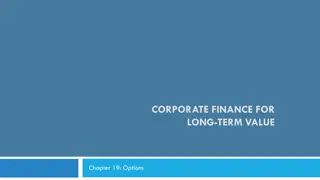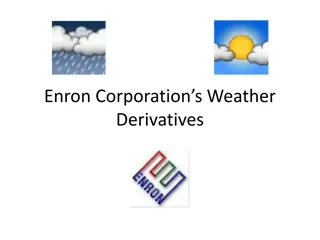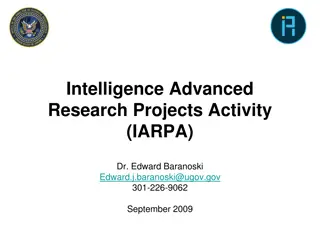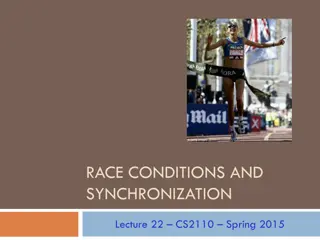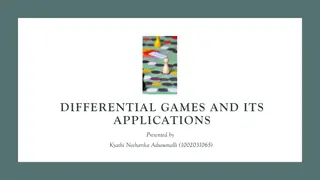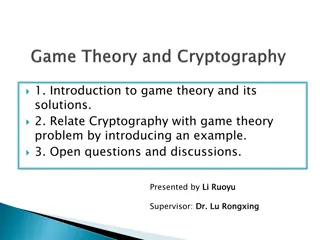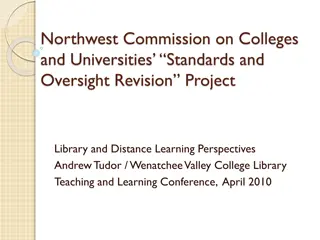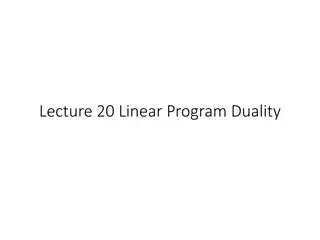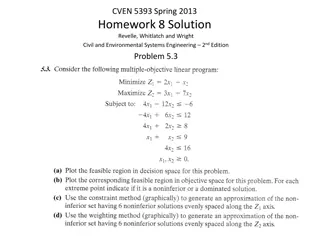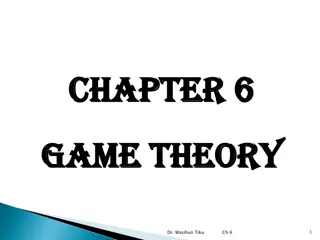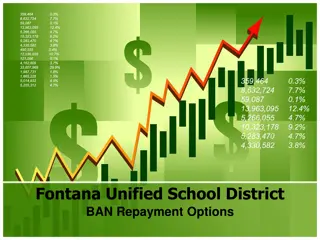Game Theory: A Strategic Framework for Decision Making
Game theory is a theoretical framework that analyzes social situations involving competing players. It helps predict outcomes in scenarios like pricing competition and product releases. Key elements include players, payoff, strategies, and optimal decisions. Game theory involves various types of gam
2 views • 15 slides
Markets with Market Power
Explore the dynamics of markets characterized by market power through a detailed analysis of topics such as monopoly profit maximization, welfare analysis, price discrimination, and competitive firm entry effects. Delve into concepts like payoff matrices, the prisoner's dilemma, and industry concent
0 views • 14 slides
Introduction to Decision Theory in Business Environments
Decision theory plays a crucial role in business decision-making under conditions of uncertainty. This chapter explores the key characteristics of decision theory, including alternatives, states of nature, payoffs, degree of certainty, and decision criteria. It also introduces the concept of payoff
0 views • 41 slides
Financial Options: An Overview of Call Options in Corporate Finance
Financial options, specifically call options, provide owners the right to buy securities at specified prices. They offer flexibility to deal with uncertainty and can be valuable tools in corporate financial decision-making. This summary dives into the concept of call options using the example of whe
0 views • 48 slides
Weather Derivatives and Risk Management in Utilities
Explore the impact of weather on businesses, specifically utilities, and how weather insurance products can help mitigate risks. Learn about Pacific Northwest Electric's challenges in the face of changing weather patterns and the use of weather protection products. Discover the utility lingo, possib
1 views • 9 slides
Decision Analysis: Problem Formulation, Decision Making, and Risk Analysis
Decision analysis involves problem formulation, decision making with and without probabilities, risk analysis, and sensitivity analysis. It includes defining decision alternatives, states of nature, and payoffs, creating payoff tables, decision trees, and using different decision-making criteria. Wi
1 views • 27 slides
Evaluation of Sustainable Vegetable-derived Binders in Pressed Powders
This study by Diogo Baltazar, Elise Velkeneers, and Slobodanka Tamburic from London College of Fashion examines the use of sustainable, vegetable-based binders as alternatives to Dimethicone in pressed powders. The aim is to address consumer demand for silicone-free products by exploring materials f
0 views • 13 slides
Innovative Research Initiatives by IARPA in Advanced Intelligence Projects
IARPA, led by Dr. Edward Baranoski, focuses on high-risk/high-payoff research to ensure U.S. intelligence superiority. Emphasizing innovation and excellence, IARPA's structured approach and Heilmeier Questions drive forward-thinking strategies to counter adversaries. The agency's three strategic thr
0 views • 7 slides
Efficient Truck Routing Program for Parcel Delivery
Create a program to efficiently route trucks for delivering parcels between cities, optimizing for cost and time constraints. Consider factors like waiting times, travel costs, and parcel payoff. Use shortest paths and implement necessary algorithms for effective truck routing.
1 views • 41 slides
Differential Games and Their Practical Applications
Differential games involve dynamic systems where players control their strategies to optimize objectives. Initially used for military analysis, these games are now applied in economics and engineering. A specific example is the Homicidal Chauffeur Game, illustrating strategic maneuvering between pla
0 views • 22 slides
Game Theory and Its Application in Cryptography
Game theory involves analyzing conflicts and cooperation among decision-makers, providing mathematical models for decision-making. By relating cryptography to game theory, we can see how rational agents make choices to maximize utility. The example of the Prisoner's Dilemma highlights strategic deci
0 views • 38 slides
Continuous Improvement in Library Standards and Distance Learning Perspectives
This presentation discusses the comparison between previous and new models of library standards, focusing on continuous assessment and improvement. It highlights the key elements of mission-driven processes, measurement, and planning, emphasizing the true payoff in the third cycle. The implications
0 views • 23 slides
Introduction to Game Theory - Strategic Interactions and Payoff Maximization
Game Theory is the formal study of strategic interactions where multiple agents aim to maximize their payoffs while considering their opponents' actions. This field finds applications in various domains such as economics, politics, and decision-making processes. Topics covered include games in strat
0 views • 54 slides
Advanced Compiler Techniques Week 4: Group Reuse and Coefficient Matrices
Explore the concept of group reuse in advanced compiler techniques, focusing on the reuse across different accesses and the impact of coefficient matrices. Understand the implications on self temporal and spatial reuse, as well as the complexity at compile time versus the payoff.
0 views • 35 slides
Game Theory Overview and Its Relevance to Networking Research
Explore the fundamentals of game theory, its applications in various fields, and its significance in networking research for economic issues, congestion control, and resource allocation. Understand the elements of a game, preference and payoff systems, and rational choice assumptions in decision-mak
1 views • 35 slides
Understanding Linear Program Duality in Two-Player Games
Explore the concept of linear program duality in the context of two-player zero-sum games. Learn about pure strategy vs. mixed strategy, game payoff calculation, and solving games using LP techniques. Dive into strategies for Duke and UNC players to optimize their game outcomes.
0 views • 14 slides
Understanding Game Theory: Important Concepts and Principles
Explore key terms in game theory like payoff matrix, saddle point, strategies, and more. Learn about two-person zero-sum games and the Maximin-Minimax Principle to analyze game outcomes effectively.
0 views • 6 slides
Solution for Multiobjective Optimization Problem with Graphical Constraint Method
Explore the solution to a multiobjective optimization problem using graphical methods and constraint analysis. The process involves plotting feasible regions, identifying noninferior solutions, constructing payoff tables, and generating approximations of the non-inferior set. Various constraints are
0 views • 10 slides
Understanding Game Theory: A Mathematical Approach to Competitive Situations
Delve into the world of game theory, a mathematical theory that analyzes competitive situations like games, military conflicts, and business competition. Explore the basics of two-person, zero-sum games and learn about strategies, payoff tables, and rational decision-making processes. Discover how p
0 views • 15 slides
Fontana Unified School District BAN Repayment Options Analysis
Explore the four repayment options for Fontana Unified School District's Bond Anticipation Note (BAN), including pros, cons, and total costs. Options range from extending BAN payoff to repaying with issuance of Certificates of Participation (COPs) or Bonds. Consider the impact on the General Fund, p
0 views • 6 slides
